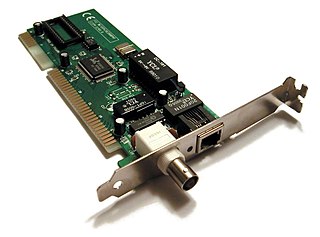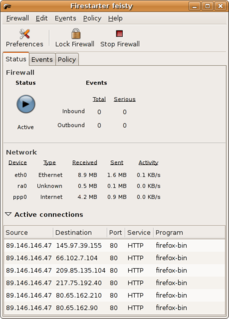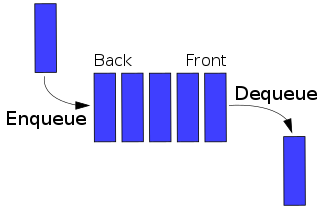External links
- iptables at netfilter.org
- libipq subversion repository
- Linux Man Page
- A quick intro to libipq
- Libipq network simulator example
libipq is a development library for iptables userspace packet queuing. Libipq provides an API for communicating with ip_queue.
Libipq has been deprecated in favour of the newer libnetfilter_queue in Linux kernel-2.6.14 onwards.
libipq has been used by some widely deployed applications as their interface to the Linux kernel-space iptables packet filter.
In computing, scheduling is the action of assigning resources to perform tasks. The resources may be processors, network links or expansion cards. The tasks may be threads, processes or data flows.

A network interface controller is a computer hardware component that connects a computer to a computer network.
Unix security refers to the means of securing a Unix or Unix-like operating system. A secure environment is achieved not only by the design concepts of these operating systems, but also through vigilant user and administrative practices.
Explicit Congestion Notification (ECN) is an extension to the Internet Protocol and to the Transmission Control Protocol and is defined in RFC 3168 (2001). ECN allows end-to-end notification of network congestion without dropping packets. ECN is an optional feature that may be used between two ECN-enabled endpoints when the underlying network infrastructure also supports it.
PF is a BSD licensed stateful packet filter, a central piece of software for firewalling. It is comparable to netfilter (iptables), ipfw, and ipfilter.
iptables is a user-space utility program that allows a system administrator to configure the IP packet filter rules of the Linux kernel firewall, implemented as different Netfilter modules. The filters are organized in different tables, which contain chains of rules for how to treat network traffic packets. Different kernel modules and programs are currently used for different protocols; iptables applies to IPv4, ip6tables to IPv6, arptables to ARP, and ebtables to Ethernet frames.
Netfilter is a framework provided by the Linux kernel that allows various networking-related operations to be implemented in the form of customized handlers. Netfilter offers various functions and operations for packet filtering, network address translation, and port translation, which provide the functionality required for directing packets through a network and prohibiting packets from reaching sensitive locations within a network.
Linux IP Firewalling Chains, normally called ipchains, is free software to control the packet filter or firewall capabilities in the 2.2 series of Linux kernels. It superseded ipfirewall, but was replaced by iptables in the 2.4 series. Unlike iptables, ipchains is stateless.

Firestarter is a personal firewall tool that uses the Netfilter (iptables/ipchains) system built into the Linux kernel. It has the ability to control both inbound and outbound connections. Firestarter provides a graphical interface for configuring firewall rules and settings. It provides real-time monitoring of all network traffic for the system. Firestarter also provides facilities for port forwarding, internet connection sharing and DHCP service.

ipfirewall or ipfw is a FreeBSD IP, stateful firewall, packet filter and traffic accounting facility. Its ruleset logic is similar to many other packet filters except IPFilter. ipfw is authored and maintained by FreeBSD volunteer staff members. Its syntax enables use of sophisticated filtering capabilities and thus enables users to satisfy advanced requirements. It can either be used as a loadable kernel module or incorporated into the kernel; use as a loadable kernel module where possible is highly recommended. ipfw was the built-in firewall of Mac OS X until Mac OS X 10.7 Lion in 2011 when it was replaced with the OpenBSD project's PF. Like FreeBSD, ipfw is open source. It is used in many FreeBSD-based firewall products, including m0n0wall and FreeNAS. A port of an early version of ipfw was used since Linux 1.1 as the first implementation of firewall available for Linux, until it was replaced by ipchains. A modern port of ipfw and the dummynet traffic shaper is available for Linux and Microsoft Windows. wipfw is a Windows port of an old (2001) version of ipfw.
The Netlink socket family is a Linux kernel interface used for inter-process communication (IPC) between both the kernel and userspace processes, and between different userspace processes, in a way similar to the Unix domain sockets. Similarly to the Unix domain sockets, and unlike INET sockets, Netlink communication cannot traverse host boundaries. However, while the Unix domain sockets use the file system namespace, Netlink processes are usually addressed by process identifiers (PIDs).

NuFW is a software package that extends Netfilter, the Linux kernel-internal packet filtering firewall module. NuFW adds authentication to filtering rules. NuFW is also provided as a hardware firewall, in the EdenWall firewalling appliance. NuFW has been restarted by the FFI and renamed into UFWI.
The Berkeley Packet Filter (BPF) is a technology used in certain computer operating systems for programs that need to, among other things, analyze network traffic. It provides a raw interface to data link layers, permitting raw link-layer packets to be sent and received. BPF is available on most Unix-like operating systems and eBPF for Linux and for Microsoft Windows. In addition, if the driver for the network interface supports promiscuous mode, it allows the interface to be put into that mode so that all packets on the network can be received, even those destined to other hosts.
Blue is a scheduling discipline for the network scheduler developed by graduate student Wu-chang Feng for Professor Kang G. Shin at the University of Michigan and others at the Thomas J. Watson Research Center of IBM in 1999.
The arptables computer software utility is a network administrator's tool for maintaining the Address Resolution Protocol (ARP) packet filter rules in the Linux kernel firewall modules.
nftables is a subsystem of the Linux kernel providing filtering and classification of network packets/datagrams/frames. It has been available since Linux kernel 3.13 released on 19 January 2014.

netsniff-ng is a free Linux network analyzer and networking toolkit originally written by Daniel Borkmann. Its gain of performance is reached by zero-copy mechanisms for network packets, so that the Linux kernel does not need to copy packets from kernel space to user space via system calls such as recvmsg . libpcap, starting with release 1.0.0, also supports the zero-copy mechanism on Linux for capturing (RX_RING), so programs using libpcap also use that mechanism on Linux.

A network scheduler, also called packet scheduler, queueing discipline (qdisc) or queueing algorithm, is an arbiter on a node in a packet switching communication network. It manages the sequence of network packets in the transmit and receive queues of the protocol stack and network interface controller. There are several network schedulers available for the different operating systems, that implement many of the existing network scheduling algorithms.
The Data Plane Development Kit (DPDK) is an open source software project managed by the Linux Foundation. It provides a set of data plane libraries and network interface controller polling-mode drivers for offloading TCP packet processing from the operating system kernel to processes running in user space. This offloading achieves higher computing efficiency and higher packet throughput than is possible using the interrupt-driven processing provided in the kernel.
firewalld is a firewall management tool for Linux operating systems. It provides firewall features by acting as a front-end for the Linux kernel's netfilter framework. firewalld's current default backend is nftables. Prior to v0.6.0, iptables was the default backend. Through its abstractions, firewalld acts as an alternative to nft and iptables command line programs. The name firewalld adheres to the Unix convention of naming system daemons by appending the letter "d".